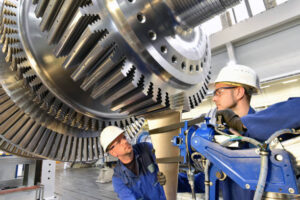Why Choose Engineering ?
Engineering is not just a field of study; it’s a gateway to creating real-world solutions and shaping the future. With diverse disciplines spanning from computer science and mechanical engineering to civil and electrical engineering, students have a plethora of options to explore. Here are some reasons why students should consider pursuing an engineering course :
Innovation and Creativity: Engineering is all about turning ideas into reality. Students have the opportunity to innovate, design, and develop products that have a meaningful impact on society.
Diverse Specializations: From robotics and artificial intelligence to sustainable energy and biomedical engineering, there’s a specialization for every interest and passion.
Global Opportunities: Engineering is a universal language. Graduates can find opportunities not only within India but also across the globe, contributing to international projects and collaborations.
Problem-Solving Skills: Engineers are problem solvers by nature. Studying engineering hones critical thinking and analytical skills that are valuable in various professional fields.
Various Institutes are offering a wide range of engineering courses tailored to meet the demands of today’s industry and tomorrow’s challenges. Some of the key features of today’s engineering courses include :
Cutting-Edge Curriculum: Courses are developed in collaboration with industry experts, ensuring that students learn the latest techniques, technologies, and trends.
Experienced Faculty: Faculty members are experienced professionals who bring real-world insights into the classroom, providing students with practical knowledge alongside theoretical concepts.
State-of-the-Art Facilities: Campuses boast modern labs, workshops, and resources that facilitate hands-on learning.
Industry Exposure: Internships, workshops, and guest lectures are an integral part of curriculum. Students gain exposure to industry practices and build valuable networks.
Engineering is a diverse field with various branches, each focusing on specific areas of technology, innovation, and application. Here’s an overview of some of the prominent branches of engineering:-

Civil Engineering :
Civil engineers are responsible for designing, constructing, and maintaining infrastructure projects such as buildings, roads, bridges, dams, and water supply systems. They ensure the safe and efficient use of resources while considering environmental and sustainability factors.

Mechanical Engineering :
Mechanical engineers work with the design, analysis, and manufacturing of mechanical systems and devices. This branch covers a wide range of applications, including machinery, robotics, HVAC (Heating, Ventilation, and Air Conditioning) systems, and aerospace technology.

Electrical Engineering :
Electrical engineers deal with the study and application of electricity, electronics, and electromagnetism. They design and develop electrical systems, circuits, and devices, including power generation, transmission, communication systems, and electronic gadgets.

Computer Science and Engineering :
Computer engineers combine principles from electrical engineering and computer science to design and develop computer hardware and software systems. They work on areas such as computer networks, artificial intelligence, software development and cyber security.

Aerospace Engineering :
Aerospace engineers specialize in the design, development, and testing of aircraft, spacecraft, and related systems. They work on areas like aerodynamics, propulsion, materials science, and avionics to ensure safe and efficient flight.

Chemical Engineering :
Chemical engineers are involved in the design and operation of processes that convert raw materials into valuable products, often in industries like pharmaceuticals, petrochemicals, and food processing. They focus on optimizing chemical reactions, separation processes, and sustainable production methods.

Biomedical Engineering :
Biomedical engineers apply engineering principles to the fields of biology and medicine. They work on designing medical devices, equipment, and technologies used in healthcare, such as imaging systems, prosthetics, and diagnostic tools.

Environmental Engineering :
Environmental engineers address environmental issues by designing solutions for waste management, pollution control, water treatment and sustainable development. They aim to protect natural resources and promote environmental sustainability.

Materials Engineering :
Materials engineers focus on developing and understanding materials used in various industries, including metals, polymers, ceramics, and composites. They work to enhance the properties of materials for specific applications.

Petroleum Engineering :
Petroleum engineers are involved in the exploration, extraction, and production of oil and gas resources. They develop technologies to maximize resource recovery while ensuring safety and environmental protection.

Industrial Engineering :
Industrial engineers optimize complex systems and processes for efficiency and productivity. They work in various industries to improve processes, manage resources, and enhance overall operations.
These are just a few examples of the diverse branches within the field of engineering. Each branch offers unique opportunities and challenges, contributing to advancements in technology and shaping the modern world. There are several more specialized sub-branches and interdisciplinary fields within engineering that students can study in India. Here are a few additional sub-branches :

Nuclear Engineering :
Nuclear engineers work with nuclear reactions, radiation, and nuclear energy applications. They are involved in designing and operating nuclear power plants, nuclear medicine technologies, and research in nuclear sciences.

Marine Engineering :
Marine engineers focus on the design, construction, and maintenance of ships, submarines, and offshore structures. They work on propulsion systems, navigation equipment, and marine operations.

Telecommunication Engineering :
Telecommunication engineers specialize in designing and maintaining communication systems such as telephony, wireless networks, satellite communication, and internet infrastructure.

Instrumentation Engineering :
Instrumentation engineers develop instruments and control systems used for measurement, monitoring, and automation in various industries, including manufacturing, energy, and process control.

Automotive Engineering :
Automotive engineers design and develop vehicles, including cars, trucks, and motorcycles. They work on areas like vehicle dynamics, engine design, safety systems, and hybrid/electric vehicle technology.

Structural Engineering :
Structural engineers focus on designing and analyzing structures to ensure they can withstand loads and environmental conditions. They work on buildings, bridges, towers, and other infrastructure projects.

Mining Engineering :
Mining engineers are involved in the extraction of minerals, ores, and other resources from the Earth. They manage mining operations, safety measures, and environmental impact assessments.

Geotechnical Engineering :
Geotechnical engineers study the behavior of soils and rocks to provide recommendations for construction projects. They assess soil stability, foundation design, and ground improvement techniques.

Textile Engineering :
Textile engineers work on the design and production of textiles and fabrics used in clothing, furnishings, and industrial applications. They focus on materials, production processes, and textile technology.

Mechnatronics Engineering :
Mechatronics engineers integrate mechanical engineering, electronics, computer science, and control engineering to design intelligent systems and products, such as robotics and automation equipment.

Renewable Energy Engineering :
Renewable energy engineers focus on technologies related to solar, wind, hydro, and other renewable energy sources. They design systems for clean energy production and storage.

Food Technology Engineering :
Food technology engineers develop processes and technologies for food production, preservation, and packaging. They ensure food safety, quality, and innovation in the food industry.

Agricultural Engineering
Agricultural Engineering is the combination of Agriculture and Technology. This field of study is transforming the face of agriculture by developing new agricultural designs, methods and equipment. With the help of various agro-tech firms and methods, Agricultural Engineering is emerging as strong branch of study in terms of usefulness and employability.
These sub-branches provide students with specialized knowledge and skills within their chosen field of engineering, allowing them to pursue careers in industries that align with their interests and expertise.
Get Started on Your Engineering Journey
If you ready to embark on a rewarding journey in the field of engineering… whether you’re a recent high school graduate or a professional looking to upskill, our engineering courses offer a pathway to success. Explore our website to learn more about our course offerings, admission requirements, and how we can help you achieve your career aspirations.
